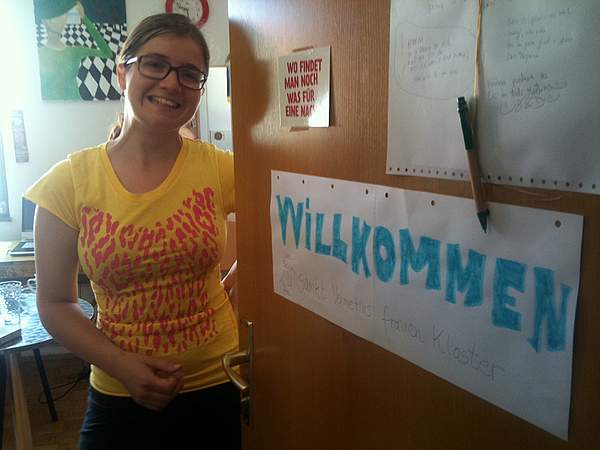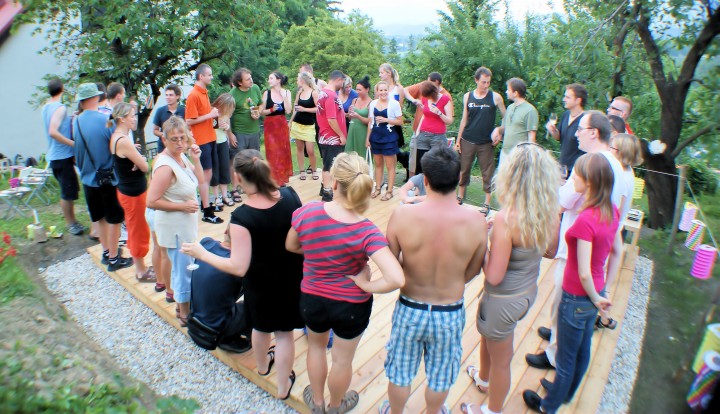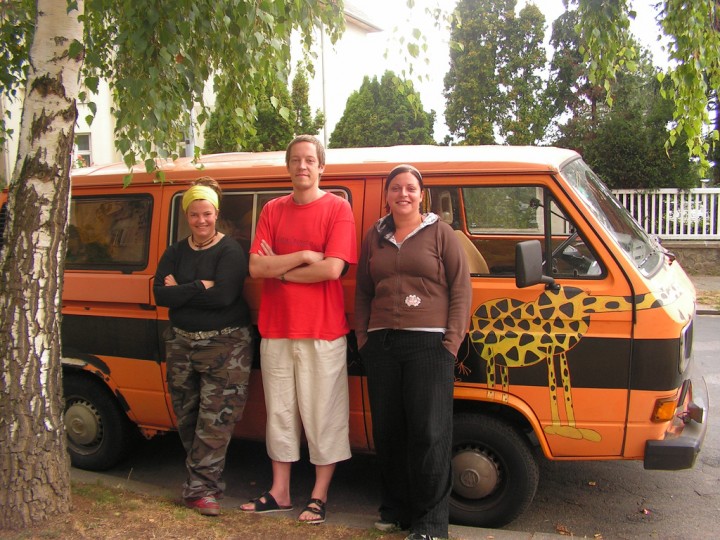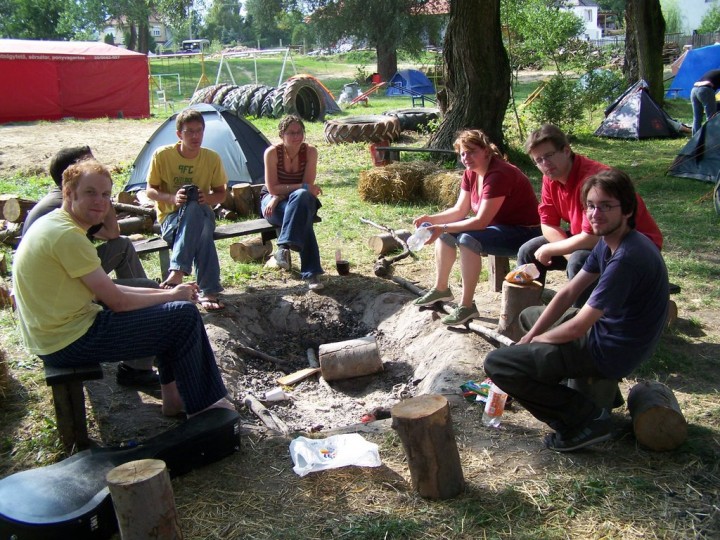I guess I can claim to be a pioneer among hospitality networks users in Czech Republic. I registered on Hospitality Club in 2004, joined CouchSurfing in 2006 because of writing an article about the new trend in travelling and hosted probably 100+ people. Many people have asked me about my experience, so I decided to sum it up in a popular form: 10+1 tips on how to enjoy CouchSurfing to the fullest!

Pavel Trojánek stayed by Mojca in Koper, Slovenia – the sign is for her flatmates returning from Germany
CouchSurfing is a service aimed to help travelers. Not just because of “free stay”, but especially because of showing you the “real” life wherever you go. When you arrive, you don’t have to rely on your guidebook or sixth sense – you’re taken straight to the venues the locals like. You meet interesting people, enjoy unexpected places and situations, and learn many different stories from all around the world… And if you don’t have the time or money to travel yourself, you let the world come to your place. Free accommodation is then merely a nice bonus.
Over the years, I hosted many people and I was a guest in London, Berlin, Vienna, Ljubljana, Sevilla, Cracow, Bratislava and Copenhagen. And all this with a minimum of negative experience (the worst thing that happened – some guys were a bit boring). I became friends with some of them, had plenty of fun, saw places I wouldn’t have seen otherwise (even in Prague). How to get the best out of it?
1. Have a great profile
Even though you often hear about how you should worry about your personal data, on CouchSurfing I really recommend to write the truth, and express yourself in a personal and interesting way (you can choose the level of privacy). I write about my hobbies and passions, about what kind of people I like to meet or about our place – so the potential guests have a clear idea of what awaits them. It’s good to write about whether your guests are going to share a room with you, about your pets (to avoid problems with allergies) or that you smoke or don’t smoke inside. And I want my guests to be open in the same way. If I have the impression they’re cool people, it makes more sense to host them, right? And it’s good to know something about each other in advance so that you can prepare. For example, bring a suitable gift (in Sevilla, we brought Becherovka, a typical Czech alcoholic drink to a Muslim, but he wasn’t offended saying he had plenty of friends who would enjoy it). And then there are two important indicators. One is the little note “CouchSurf requests replied to” – it indicates whether the other person replies to requests or not – you don’t have to host everyone, but it’s important to answer requests – imagine yourself in the situation of a guest (and I can tell you that if you start to use the site as a traveler, you will soon realize how annoying it might be to write ten requests and wait hopelessly for an answer). If you know you aren’t able to host, just set your status to “NO” or “Travelling” and other members will not be able to send you requests.
And of course – references. It’s understandable that in the beginning, it’s harder for people without references, so you might check whether your real life friends are on CS (you can use FB Connect too). Write reasonable references, be honest, and share your experiences. If you have a negative feeling, try to discuss it privately first (it might be a cultural misunderstanding) and/or check References FAQ.
2. Arrange the meetings well
When giving the instructions on how to get to your place, be precise and accurate. Send a Google Maps link, describe the transport possibilities. Give your cell phone number (and ask for theirs, and tell them to send a message on arrival to your city). Personally, I have a bad experience with people unable to use phone (they don’t have one, it doesn’t work or they ran out of credit and are unable to charge it). It’s a big obstacle for both you and them – because if there’s any delay or they get lost, it’s much harder to get everything back on track. For some time I even kept an old phone with a pre-charged SIM card to give it to my guests – in the end it’s much easier for everyone. And if you’re the guest, try to be always there on time, write or call if you can’t make it. Make sure your roaming is active and you don’t run out of credit. And include a photo of you in your profile – one that will be sufficient for others to recognize you.
3. Don’t rely solely on CS, always have another plan
I never get into such a situation myself, but it’s very foolish to forget about a second plan. Your host can get into an unexpected situation that will force them to leave. Always have enough money for a hostel. Travelling with CouchSurfing is surely good for your budget, but if you wouldn’t be able to make your travel otherwise, think twice.
Some hosts will care about you a lot and even insist on paying for you in pubs – but not only shouldn’t you count on it, it’s rude not to pay it back in some way. I believe most of us don’t like to be freeloaders.
4. State your rules as a host, follow rules as a guest
There are different people and cultures. Though CouchSurfing tends to connect young, educated and tolerant people, experienced in travelling – still it’s reasonable to have some clear rules and inform your guests about them, especially if you don’t live on your own, but with family or flat mates. In the Czech Republic it’s normal to take off your shoes at home and wear slippers (which some foreigners consider a great idea, but to many it sounds at least odd at first and they even think sometimes it’s a strange religious habit). But there are other points: is it OK for your guests to use the kitchen (and it means – it’s OK to cook, should they help themselves with the food in the fridge, are they supposed to do the dishes)? Can they smoke inside? Do you provide them with linen or should they have their sleeping bags? When do you wake up in the morning and are they supposed to leave the place with you? I personally often handed an extra set of keys to my guests and it went just fine in all cases – but it’s totally up to you.
When you’re in the guest role, ask for these things, behave reasonably (if you’re going to Holland and plan to stay high during your stay, head to a hostel or find a host sharing your hobby – most of the members are fed up hosting those kinds of tourists and I can see why), respect local rules. If you feel uncomfortable about something – let your host know in a polite, but clear way. And realize that topics like politics or religion might be a sensitive issue. Through CS you can learn a lot about the true beliefs of people, but also end up in a heated argument.

Some people, you just click with immediately. “We've only known each other 24 hours right?” (photo by Stephen McLeod Blythe)
5. Safety and trust
Many people are suspicious about the safety measures. What if somebody takes advantage of my good will and rob me? I must say that not only I haven’t had such an experience in the slightest, but I’ve never heard from someone that it would have happened to him or her. The truth is that such cases have been recorded, but it’s a very, very rare case (in fact the chance your house is robbed is most probably bigger). And it can be avoided – if you read the references or host only people who already have several references, the chance you got into trouble is practically zero. There are two kinds of verifications (not obligatory, costs 25 USD these days): Name and Address – you pay by card issued to the name you give a small amount and then you receive a postcard with a code to the address you have in your profile. This verifies both your name and address. Another level is being “vouched for” – only a person that has been vouched for by three people already having that privilege can pass it further on. If you reach this – be careful when to use it.
It might sound like a paradox, but as far as I know, in a much shorter history of AirBnB, which you might call a commercial variant of CouchSurfing, there were more cases of theft or serious damage than on CS.
6. Bring a gift
I mentioned already a situation where we brought alcohol to a Muslim. That’s exactly a kind of faux pass situation, but generally, a small bottle of Becherovka or Slivovice works quite well. Another option I found that worked quite well is “cultural exchange” – I carry a flash disk with my favorite music (ehm… I guess I should point out that it is all Creative Commons net label kind of stuff, so my site isn’t shut down by RIAA), or a DVD with a Czech movie with English subtitles. You can also cook your favorite meal – I had the pleasure of having a Spanish or Vietnamese dinner in Prague and I really liked that. Also important: be able to receive gifts.
7. CouchSurfing is not a dating site (or is it?)
Well, I have met a couple that got together through CS (a Dutch guy and a girl from Argentina that ran into each other thanks to CS meetings in Ireland where they both lived), but I hope it’s clear that a gentleman doesn’t lure a lady to his bed the day they meet. Even just suggestions in that way might lead to a quick removal of the profile considered – sexual harassment is fought very fiercely. Girls that post photos which are too sensual, might sometimes get messages from guys from Turkey or Arabic countries (experience of my friends) that they are princesses etc. (not sure whether this is still happening – the cases I’ve heard about took place couple of years ago) – you can simply ignore these or report profiles in question as behaving in an inappropriate way. On the other hand, when I was in a CS/HC camp in Hungary in summer 2007, it was quite clear, that casual sex is sought by both boys and girls – it’s up to you. Recommended reading: Handling dating requests.
8. What to show to your guests
In this part, I only share my personal experience and opinion – you can have it your way! Many guests appreciate if you can spend some time with them. And it could be interesting even for you to see your city through foreigners’ eyes. You can again realize a lot of beauty (I wrote about it in my review of Alain de Botton’s Art of Travel) you don’t see as it becomes a routine. Or you might realize all the tourists’ traps set in your city. But rather than showing these “Top 10” must see places (your guests can read about in every guidebook), show them your favorite spots. A typical Czech pub is probably more interesting than an expensive French restaurant. In Prague, I liked to take people to Cross Club (steam punk psycho place), U Vystřelenýho voka (an underground reminiscence of Prague from 90’s) or Jazzdock (a stylish jazz club on the riverside). It’s useful to have a map for them or to recommend an exhibition or some concert. In Prague, I also used to recommend Spotted by Locals guide and in Brno my friend’s blog BrnoNow. Also the relaxed Czech attitude towards marijuana consumption made quite an impression on some of my guests  It’s often fun to take your guests along to a party with your friends – but it shouldn’t end up dragging them somewhere and leaving them just once you enter the place.
It’s often fun to take your guests along to a party with your friends – but it shouldn’t end up dragging them somewhere and leaving them just once you enter the place.
9. Write personal requests
When writing a request, take your time and don’t copy paste (too much). First dilemma – how much in advance you should write. This is a feature I miss on CouchSurfing (Hospitality Club has it ever since 2004) – a field saying ‘contact me NOT earlier than XX and LATEST YY before arrival’. I personally would fill in ‘not earlier than month in advance, not later than three days before coming’. My plans change quite often and I don’t know about my whereabouts in half years’ time. But that’s a very individual setting, so make sure you read the profile – it might be written there (when hosting, I wrote about planned trips asking people to spare their and my time and NOT request a couch for the dates I state I’m not in Prague).
Read about the person you write to, and make it clear in your request. And of course it makes sense to read the profiles, as you might really find people with similar interests, taste in music, lifestyle. It’s nice to introduce yourself, let the other side know why you chose to write them and/or why do you travel to their city, what are your plans and what are you interested in. Just “My name is, I study this and I go with a friend of mine to Paris, since we heard it’s a beautiful place” – that doesn’t really work. I’m afraid Parisians receive way too many requests like this.
A tricky question – what’s a better strategy, to contact people with many positive comments (they’re probably nice and experienced hosts, but they might be overwhelmed with requests) or people who are newbies (might be eager to host, but maybe they just decline requests). If you receive more positive answers, choose one, but respond to everybody! And please, use Requests, not Messages – it makes life much easier for everyone.
10. Try the meetings first
In bigger cities (I have my personal experience in Prague and Brno), there are meetings and group activities taking place all the time. Such events are especially popular among expats. There might be even groups dedicated to certain language / culture (French or Spanish groups in Prague). If you’re new to CS, it can help you to discover the spirit and get the first references (though it’s important to realize, that the most active members participate in meetings and so it’s not an accurate picture of an average CouchSurfer). Not to mention many other advantages it brings – practicing English, meeting friendly people from around the world… Mid-range events are sometimes called “invasions” (e.g. Vienna-Prague invasion is an event when tens of Vienna based members hop on the train to Prague) and there are also huge events – sometimes called camps taking place all over Europe in summer or on New Year’s Eve. You can explore Groups too – some are based on location, many others on shared interests. Bikers, vegans, hitchhikers, musicians, families with babies, queer CSers – you name it.

Garden party for couchsurfers and friends organized by Robert Vlach, founder of CS OSTRAVA!!! and Beskydy groups (photo by Jana Orálková)
11. How to make sure people requesting couch read your profile
If you live in a place where there are more requests and you have the feeling of being flooded by copy-paste messages, there’s a trick you can use. I saw it once and liked it, so when living in Prague, I used it too. In my profile there’s a piece of information (in the Couch section): “I appreciate being a member of CS, but I don’t consider myself a “free hostel”. I value personality and personal approach, so I read profile of my hosts and guests – and I suppose they do that too. So when asking for couch, please add the phrase: “I AM OPEN-MINDED”. This way I will know you read my profile and not just copy paste your message.” It’s not that I wouldn’t host a person that omits these words, but I like to see that people took the time to read my profile.
CouchSurfing has become one of the most interesting, never ending adventures in my life, connecting online and offline world, showing that people grouching about internet destroying real life friendships are simply wrong. In my opinion, this project with over 3M members (however many of them are inactive) did more for the world peace than 99% of politicians. Because when you arrive in a foreign country and there’s someone willing to help you, you might realize that you can find great people (as well as many idiots) in every corner of our planet and that nationalism is pretty weird stuff. I’m thankful for those eight years of hospitality exchange experience and I hope our family will enjoy it for years to come.
Recommended reading: The Art of Couchsurfing Awesomely – written by Roy, ex-Prague CS ambassador.
Hospitality networks
-
Hospitality club – The first internet hospitality site that made it big. Since 2006 it has been surpased by CS and the functionality and the design is pretty “old school”. The owner and founder Veir Kühne has been accused of using the money from AdSense for his personal gain by a huge group of volunteers. Slightly “dead” compared to CS, but still over 600k members.
-
CouchSurfing – A leading site in terms of numbers and quality, founded in US in 2004. In 2011 it announced the change to a for-profit organization, which caused a backslash among many volunteers that see it as a missed opportunity and a scam towards volunteers.
-
BeWelcome – The site created by angry volunteers from both HC and CS, but it has just little more than 20k members. So it’s probably the most open-source and spiritually nice one, but there are not many members which makes it a bit hard to use.
-
Servas – the original organization that worked in a similar way, but off-line. It claims to have 13k members, most of them are rather older (40+).
-
AirBnB – hospitality networks are based on the rule that you do NOT charge for your place. AirBnB lets you earn money. Some people might stick to it so they have advantages of both “cultural exchange” (as opposed to hotels) and “secured comfort” (you paid for something so you are not dependent on a goodwill of the host). I already used AirBnB and I think it’s going to be complementary – and might be a good option for people who don’t want to mess with sending many requests and / or are not able to take part as hosts (and thus they don’t want to use CS just for surfing). The site got a lot of money in funding from angel investors, claims to have over 200k listings and is seen as a “next big thing” by many in the tech scene.
hospitality networks enthusiast
www.zbiejczuk.com









